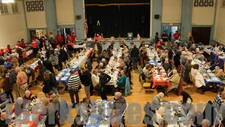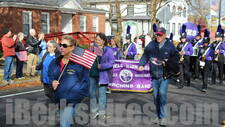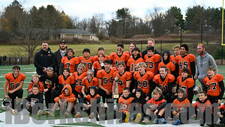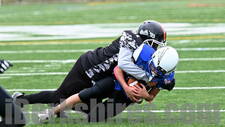Trio of Berkshire Red Cross Volunteers To Aid Gulf CoastBy Susan Bush
12:00AM / Sunday, August 28, 2005
 | | A late afternoon Aug. 28 national weather agency image of Hurricane Katrina. |
Pittsfield - A trio of Berkshire County American Red Cross volunteers are set to travel to the Gulf Coast region expecting a hit from Hurricane Katrina, currently a Category 5 storm making its’ way toward the low-lying, heavily-populated Louisiana city of New Orleans.
[Aug. 29 update: Hurricane Katrina has been downgraded to a Category 3 storm and, while seriously affecting New Orleans, appears to be pounding Biloxi, Mississippi and surrounding areas.]
The team may have already left the Berkshires as of this writing.
Mobilization Underway
Berkshire Red Cross Executive Director Kathleen Phillips of Dalton said earlier today [Aug. 28] that the American Red Cross has already begun a nation-wide mobilization effort to aid with the catastrophe conditions that Katrina is expected to leave behind. Final details for the Berkshire Red Cross contingent were ironed out over the weekend.
“The national Red Cross has already mobilized,†said Phillips during a late afternoon interview. “Requests [for Red Cross volunteers] went out yesterday and this morning. We have three volunteers ready to go down.â€
The American Red Cross national headquarters is in Washington, D.C..
A trained communications specialist with ham radio operator certification and two volunteers who will likely be assigned as shelter workers make up the Berkshire Red Cross team, Phillips said.
“These people will be joined by probably about another 400 to 500 Red Cross volunteers mostly from the northeast and east,†Phillips said.
Rapid Response
The volunteers will face a variety of hardships as they assist hurricane victims. Red Cross volunteers will help set up and staff Red Cross shelters and assist with distribution of food and clothing. The Red Cross disaster response teams also include medical professional such as nurses, who provide care and assistance with health-related situations and emergencies.
In cases when disasters can be anticipated, such as hurricanes, the Red Cross works to dispatch volunteers before the expected situation strikes, Phillips said. Keeping volunteers away until after an anticipated and unstoppable event occurs is likely to mean delays and logistical difficulties with delivering services because often, an affected area may be extremely difficult to access.
Dire Situations Possible
Life in the city known as the “Big Easy†stands to be anything but easy should Hurricane Katrina track as expected.
New Orleans sits below sea level along the Gulf of Mexico coastline and hosts about 1.3 million people. Significant, record-breaking floodwaters that could sweep through many portions of the city have been predicted as potential hurricane factors. Massive, lengthy electric power failures have also been emphasized as potential Katrina consequences. Excessive moisture, high air temperatures, and high humidity levels alone could generate enormous problems; a ravaged, ruined environment without electrical power could place and keep people in shelters for extended time periods.
Thousands of people clogged the interstate highways leading away from the city during Aug. 28; those who cannot evacuate are being offered shelter in venues such as the Superdome, which, according to various televised news reports, can hold between 50,000 to 70,000 people
Red Cross volunteers could be stationed within the region for weeks or months if predicted worst-case scenarios become reality, Phillips said.
“If this hits, it is likely to be a tremendous disaster,†Phillips said. “The Red Cross will be there [in that event] for months.â€
How to Help
New Orleans and nearby areas are destination points for many New Englanders, including those from Southern Vermont and the Berkshires, who travel there for events such as Mardi Gras.
American Red Cross Hurricane Katrina assistance efforts will benefit from financial donations, and monetary donations funneled through the Red Cross would also aid the economy of the region post-hurricane, Phillips said.
Donations of items such as food, clothing, blankets, and other articles can be expensive to ship and even more difficult to distribute, Phillips said.
“In disaster areas, it can be almost impossible to set up distribution centers,†Phillips said. “And the costs of shipping can be quite high.â€
Additionally, any perishables may spoil during shipping or before they can be delivered to disaster victims.
Monetary donations may be designated to a particular relief effort and will bring the most benefit to a stricken area, Phillips said. Volunteers located within a specific area know what is needed and spending money in a disaster-ravaged region can keep the merchants of the area in business and save jobs.
“It bolsters the economy,†she said."Keeping the economy going is extremely important for a disaster area."
Phillips stressed the trustworthiness of the Red Cross organization.
"We work very hard to keep our integrity,†she said, and emphasized that donations are used to help those in need.
The agency is able to work both proactively and reactively and is among the most respected in the world. Agency volunteers and employees may provide assistance with securing food, clothing, emergency home repairs, transportation, emergency medical treatment, and mental health services. The agency hosts frequent blood donation drives and makes blood products available to disaster-stricken areas.
The agency also offers information about community and government resources that can offer help, according to information available at the www.redcross.org Internet web site.
The American Red Cross also offers other services, such as services to families of military troops.
Donations earmarked for relief efforts associated with Hurricane Katrina or general donations may be sent to the Berkshire Chapter of the American Red Cross at Berkshire County Red Cross, 480 West St., PO 644, Pittsfield, Mass., 01202. Check or money order donations meant specifically for Hurricane Katrina should be designated as such on the document, Phillips said.
Information about credit card and telephone donations and additional information about the American Red Cross and the Berkshire County Chapter of the American Red Cross is available at the www.redcross.org or www.redcrossberkshirecounty.org Internet web sites.
Susan Bush may be reached via e-mail at suebush123@adelphia.net or at 802-823-9367.
|



















